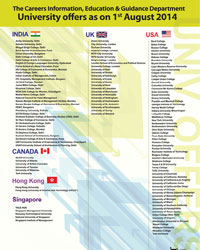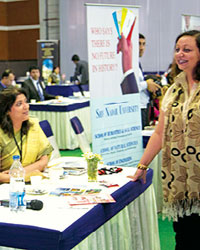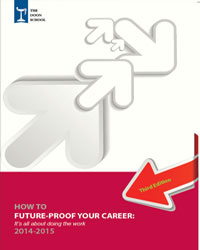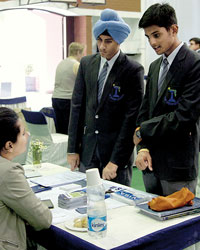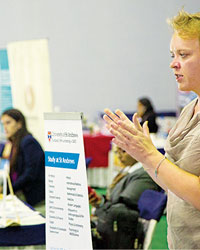Invest in your Future: Doon Launches Universities and Colleges Fair, 2014
The school organized its first large scale careers and university fair. It featured a cross-section of excellent university and college institutions, combined with first class presentations on a range of topics from scholarships and visas to the value of doing the research into the course and the institution from country to country. The fair was open to invited schools from the region as part of the school’s aim to support the wider community, and to parents of boys at Doon.
One year on, The Dosco interviews Stephen Magee:
Q. Where were you pre-The Doon School?
A. I was Pro-Chancellor of the University of St Andrew’s for ten years and oversaw the internationalisation of Student Recruitment and Admissions, with particular emphasis on the USA, and ten more years in all areas of admissions and wider and before that headed the university’s admissions, careers service and wider communications and human resource and development with fundraising.
Q. How have you found the first year in the department at school?
A. The team here is very impressive and I can say that as I have worked with many College Counselling offices in prestigious US high schools.
Q. What travel and training opportunities have you had and why is this so important?
A. At the school’s request, I have been able to attend the CIS Conference in Monaco, the OACAC Conference in Tampa and most recently visited a range of prestigious US universities from Georgetown to Emory via UVA and Duke, amongst others. These interactions are absolutely vital in building sustainable long-term relationships with universities, as well as keeping up to date professionally with current trends in admissions and financial aid.
Q. What have been the biggest challenges?
A. Introducing some different perspectives into the ambitions of Doscos and parents alike – getting across the message that there are many excellent universities which have exceptional brand names just not so well-known yet in India, alongside the knowledge that there are really incredibly few places available to applicants from outside the USA in the top institutions and that success can be measured realistically in terms other than Ivy League!
Q. What are some key trends that you have observed about course and college choice, and why?
A. While Engineering an Economics remain the most popular choices, there is a growing recognition of two things vis-a-vis the USA Higher Education sector: one, that other disciplines are not only important but essential to pursue a degree in US institutions with the prevalent liberal arts tradition, interdisciplinary and the declared major only really biting in the Junior year; and two, that there is a significant number of institution outside the US News Top 20 and particularly the Liberal Arts and Sciences Colleges themselves, many of which are absolutely first rate and from which so many go on to graduate school.
Aanchal Negi also joined at the same time. Here are some of her thoughts on joining this busy department:
‘I got an opportunity to travel to the USA in July this year. Although I had travelled earlier to other countries in my previous role as a careers counsellor, going to the US this year was a learning experience in itself. I am seeing a change in the boys’ interests towards courses offered as part of the liberal arts and sciences, greater interest in the humanities and a move away from the traditional courses in business and engineering. One of the reasons for this change is that the boys now have a wider variety of subjects to choose from at a much younger age in school and they are not always sure of what they want. In these cases, the course make-up at liberal arts and sciences courses works best for them where they study subjects in both arts and science in their first two years, and then specialize in their third and fourth years. They also have an opportunity to pursue their academic study side by side with their interest in art, drama, music and sport. These interests prepare boys for the professional world by helping them develop their interests and hone their communication and interpersonal skills. They are interests that they will take with them for the rest of their lives.’

 ANNOUNCEMENT
ANNOUNCEMENT

